The Points BreakI only vaguely remembered that they made a remake of Kathryn Bigelow’s 1991 film Point Break last year when I caught a few moments of it on TV. The next week, a friend told me that the remake of Point Break, this time directed by Ericson Core, was actually good, because “this time, Johnny Utah can act.” Instinctively, I backed Bigelow before thinking through the fact that her protagonists (Utah and Pappas) were played by Keanu Reeves and Gary Busey. So, I was challenged to watch and review both the 1991 and 2015 versions of Point Break and determine once in for all which was the superior film. After watching both versions, I’m struck by how radically different these films actually are.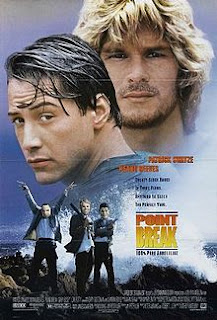 Bigelow’s 1991 film is a fairly simple story. A group of bank robbers led by Bodhi (Patrick Swayze) is terrorizing Los Angeles. Pappas (Busey) figures out that the robbers are also surfers, committing crimes in order to fund their summer of care free adventure. Pappas’ new partner, erstwhile college football star, Johnny Utah (Reeves) infiltrates the surfing culture of Southern California in order to identify the bank robbers and bring them to justice. Bigelow’s film has a languid, SoCal pace. The film takes its time to establish a romance between Utah and Tyler Endicott (Lori Petty). There are extended scenes of learning to surf, bobbing gently in the calm sea on a surf board, and late night touch football games lit by headlight.
Bigelow’s 1991 film is a fairly simple story. A group of bank robbers led by Bodhi (Patrick Swayze) is terrorizing Los Angeles. Pappas (Busey) figures out that the robbers are also surfers, committing crimes in order to fund their summer of care free adventure. Pappas’ new partner, erstwhile college football star, Johnny Utah (Reeves) infiltrates the surfing culture of Southern California in order to identify the bank robbers and bring them to justice. Bigelow’s film has a languid, SoCal pace. The film takes its time to establish a romance between Utah and Tyler Endicott (Lori Petty). There are extended scenes of learning to surf, bobbing gently in the calm sea on a surf board, and late night touch football games lit by headlight. Core’s film can’t be contained to Southern California. He ups the ante, reinventing Bigelow’s surfing bank robbers as eco-terrorists driven to complete a legendary series of extreme sports challenges known as “the Ozaki 8” in order to pay tribute to a dead mentor. Utah (Luke Bracey) an FBI agent haunted by the death of his friend during an extreme sports accident rejoins the world of extreme sports in order find the robbers and bring them to justice. Core’s film is a travelogue of danger and features amazing stunt work that no one could have dreamed of filming in the 90s. It plays with more speed and urgency than Bigelow’s film, and, in spite of adding more sports, more stunts, and a more complicated motivation for the robberies, Core’s film clocks in a full six minutes under Bigelow’s run time. There’s time for sex but not love. There’s time for professions of bro-mantic feeling but no time to create an audience investment in it. There’s glamour and adrenaline, but there’s not much heart. So which is better? That really depends.The Case for Core: “We have to give back more than we take.” – Bodhi.
Core’s film can’t be contained to Southern California. He ups the ante, reinventing Bigelow’s surfing bank robbers as eco-terrorists driven to complete a legendary series of extreme sports challenges known as “the Ozaki 8” in order to pay tribute to a dead mentor. Utah (Luke Bracey) an FBI agent haunted by the death of his friend during an extreme sports accident rejoins the world of extreme sports in order find the robbers and bring them to justice. Core’s film is a travelogue of danger and features amazing stunt work that no one could have dreamed of filming in the 90s. It plays with more speed and urgency than Bigelow’s film, and, in spite of adding more sports, more stunts, and a more complicated motivation for the robberies, Core’s film clocks in a full six minutes under Bigelow’s run time. There’s time for sex but not love. There’s time for professions of bro-mantic feeling but no time to create an audience investment in it. There’s glamour and adrenaline, but there’s not much heart. So which is better? That really depends.The Case for Core: “We have to give back more than we take.” – Bodhi.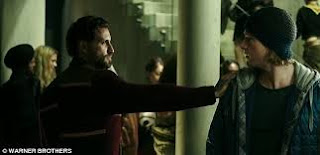 As an action movie, Core’s version is much more successful. The characters are more specifically drawn. Their motivations are more interesting; “the Ozaki 8” and its attendant new age/adrenaline rush philosophy are interesting hooks. The action is way more intense, and Luke Bracey is a better actor than Reeves. There’s a good case that Core has improved on Bigelow’s work here. Unfortunately, as I said before, Core’s film feels nearly heartless. That’s a shame. Core demonstrates, in a single scene, that he has the ability to play on our sense of wonder and heart strings as ably as he lights up our adrenal glands. The scene where Utah and Samsara (Teresa Palmer) dive from a ship and explore an underwater cave without oxygen tanks plays beautifully. He could have given us more like this and handily beat Bigelow at her own game.But Bet on Bigelow: “Big-wave riding’s for macho assholes with a death wish.” – Tyler Endicott.
As an action movie, Core’s version is much more successful. The characters are more specifically drawn. Their motivations are more interesting; “the Ozaki 8” and its attendant new age/adrenaline rush philosophy are interesting hooks. The action is way more intense, and Luke Bracey is a better actor than Reeves. There’s a good case that Core has improved on Bigelow’s work here. Unfortunately, as I said before, Core’s film feels nearly heartless. That’s a shame. Core demonstrates, in a single scene, that he has the ability to play on our sense of wonder and heart strings as ably as he lights up our adrenal glands. The scene where Utah and Samsara (Teresa Palmer) dive from a ship and explore an underwater cave without oxygen tanks plays beautifully. He could have given us more like this and handily beat Bigelow at her own game.But Bet on Bigelow: “Big-wave riding’s for macho assholes with a death wish.” – Tyler Endicott.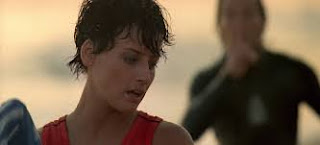 Bigelow, for her part, misses the point of this material – I think intentionally – in order to explore her own pet themes as a filmmaker. Bigelow’s entire filmography is devoted to interrogating the performative aspects of masculinity. She is devoted (obsessed?) with what and how it is that men appear to be men. Over time, she’s developed a very sensitive eye and revealed aspects of masculinity that male directors have missed precisely because she is seeing it from the outside. Point Break is an early work in this ongoing effort for Bigelow. As a result, it’s cruder than her more recent achievements. That said, she draws intriguing parallels between the masculine culture of the FBI with its useless, risky (and almost certainly fictional) diving challenges and surfer culture with its obsession with finding the biggest wave even if it kills you.Bigelow also benefits from Swayze’s onscreen presence as Bodhi. Swayze has more charisma than his 2015 analogue (Edgar Ramirez). Of course, Swayze also has an easier job. All he has to do is convince people to steal a few bucks to fund an endless party. Ramirez has to convince us that getting adrenaline rushes from the earth justifies barely related acts of eco-terrorism. I’d rather party with Swayze than riot with Ramirez.Bigelow’s other secret weapon is “Tank Girl” Tyler Endicott. Lori Petty actually has a role to play in Bigelow’s version of Point Break. She has a perspective of her own. She matters to our hero. So she matters to us.Bigelow also punctuates the film with bursts of shocking violence giving her film an edge and flavor that action films could have in the 90s but that has been largely ironed out of action movies today, and that was completely ironed out of the remake.“It’s a state of mind.” – Bodhi.
Bigelow, for her part, misses the point of this material – I think intentionally – in order to explore her own pet themes as a filmmaker. Bigelow’s entire filmography is devoted to interrogating the performative aspects of masculinity. She is devoted (obsessed?) with what and how it is that men appear to be men. Over time, she’s developed a very sensitive eye and revealed aspects of masculinity that male directors have missed precisely because she is seeing it from the outside. Point Break is an early work in this ongoing effort for Bigelow. As a result, it’s cruder than her more recent achievements. That said, she draws intriguing parallels between the masculine culture of the FBI with its useless, risky (and almost certainly fictional) diving challenges and surfer culture with its obsession with finding the biggest wave even if it kills you.Bigelow also benefits from Swayze’s onscreen presence as Bodhi. Swayze has more charisma than his 2015 analogue (Edgar Ramirez). Of course, Swayze also has an easier job. All he has to do is convince people to steal a few bucks to fund an endless party. Ramirez has to convince us that getting adrenaline rushes from the earth justifies barely related acts of eco-terrorism. I’d rather party with Swayze than riot with Ramirez.Bigelow’s other secret weapon is “Tank Girl” Tyler Endicott. Lori Petty actually has a role to play in Bigelow’s version of Point Break. She has a perspective of her own. She matters to our hero. So she matters to us.Bigelow also punctuates the film with bursts of shocking violence giving her film an edge and flavor that action films could have in the 90s but that has been largely ironed out of action movies today, and that was completely ironed out of the remake.“It’s a state of mind.” – Bodhi.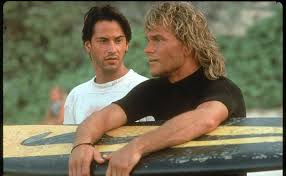 Honestly, it really is hard to choose the superior version of Point Break. In terms of quality, they aren’t actually that far apart. Pressed for an answer, I would give a slight edge to Bigelow’s 1991 original. She made it into a richer text. I would give it 2.5 stars out of a possible 5. Of course, none of what Bigelow put into the picture is really necessary. These films only exist so that the audience can experience getting totally radical vicariously. By that score, Core’s 2015 remake is the superior picture. Still, I would only give Core’s remake 2 stars, because …“They don’t understand the sea.” – Bodhi.
Honestly, it really is hard to choose the superior version of Point Break. In terms of quality, they aren’t actually that far apart. Pressed for an answer, I would give a slight edge to Bigelow’s 1991 original. She made it into a richer text. I would give it 2.5 stars out of a possible 5. Of course, none of what Bigelow put into the picture is really necessary. These films only exist so that the audience can experience getting totally radical vicariously. By that score, Core’s 2015 remake is the superior picture. Still, I would only give Core’s remake 2 stars, because …“They don’t understand the sea.” – Bodhi.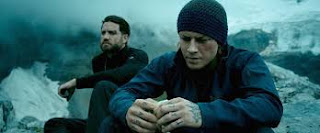 Part way through the remake of Point Break, they did a thing that really bugs me. One of Bodhi’s henchmen explains that you have to master your fear or “You’ll reach your line. The point where you break and fear becomes master and you become its slave.” That was a long way to go to emphasize the title words in the wrong order.
Part way through the remake of Point Break, they did a thing that really bugs me. One of Bodhi’s henchmen explains that you have to master your fear or “You’ll reach your line. The point where you break and fear becomes master and you become its slave.” That was a long way to go to emphasize the title words in the wrong order.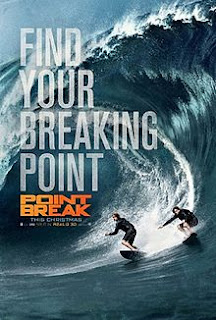 For the record, the title of both versions of Point Break refer to an actual ocean phenomenon called a “point break” – a specific type of wave break that occurs when ocean waves hit on a point of land that sticks out beyond the rest of a land mass. The original 1991 film’s final scene is set at Bells Beach, Australia, a location famous for its point break. I hate it when film remakes come up with “new” justifications for elements of the original because people have become too stupid over the intervening decades to understand the title’s original meaning. *See also, the remake of Star Trek reinventing the origin story of the nickname "Bones" lest its audience have to know that "sawbones" was once slang for "surgeon."Of course, that’s just my opinion, and you can’t put too much stock in it. After all, I’m a lawyer, and …
For the record, the title of both versions of Point Break refer to an actual ocean phenomenon called a “point break” – a specific type of wave break that occurs when ocean waves hit on a point of land that sticks out beyond the rest of a land mass. The original 1991 film’s final scene is set at Bells Beach, Australia, a location famous for its point break. I hate it when film remakes come up with “new” justifications for elements of the original because people have become too stupid over the intervening decades to understand the title’s original meaning. *See also, the remake of Star Trek reinventing the origin story of the nickname "Bones" lest its audience have to know that "sawbones" was once slang for "surgeon."Of course, that’s just my opinion, and you can’t put too much stock in it. After all, I’m a lawyer, and …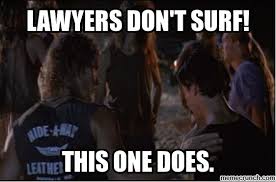 From Out in the Void,Steven
From Out in the Void,Steven
 Bigelow’s 1991 film is a fairly simple story. A group of bank robbers led by Bodhi (Patrick Swayze) is terrorizing Los Angeles. Pappas (Busey) figures out that the robbers are also surfers, committing crimes in order to fund their summer of care free adventure. Pappas’ new partner, erstwhile college football star, Johnny Utah (Reeves) infiltrates the surfing culture of Southern California in order to identify the bank robbers and bring them to justice. Bigelow’s film has a languid, SoCal pace. The film takes its time to establish a romance between Utah and Tyler Endicott (Lori Petty). There are extended scenes of learning to surf, bobbing gently in the calm sea on a surf board, and late night touch football games lit by headlight.
Bigelow’s 1991 film is a fairly simple story. A group of bank robbers led by Bodhi (Patrick Swayze) is terrorizing Los Angeles. Pappas (Busey) figures out that the robbers are also surfers, committing crimes in order to fund their summer of care free adventure. Pappas’ new partner, erstwhile college football star, Johnny Utah (Reeves) infiltrates the surfing culture of Southern California in order to identify the bank robbers and bring them to justice. Bigelow’s film has a languid, SoCal pace. The film takes its time to establish a romance between Utah and Tyler Endicott (Lori Petty). There are extended scenes of learning to surf, bobbing gently in the calm sea on a surf board, and late night touch football games lit by headlight. Core’s film can’t be contained to Southern California. He ups the ante, reinventing Bigelow’s surfing bank robbers as eco-terrorists driven to complete a legendary series of extreme sports challenges known as “the Ozaki 8” in order to pay tribute to a dead mentor. Utah (Luke Bracey) an FBI agent haunted by the death of his friend during an extreme sports accident rejoins the world of extreme sports in order find the robbers and bring them to justice. Core’s film is a travelogue of danger and features amazing stunt work that no one could have dreamed of filming in the 90s. It plays with more speed and urgency than Bigelow’s film, and, in spite of adding more sports, more stunts, and a more complicated motivation for the robberies, Core’s film clocks in a full six minutes under Bigelow’s run time. There’s time for sex but not love. There’s time for professions of bro-mantic feeling but no time to create an audience investment in it. There’s glamour and adrenaline, but there’s not much heart. So which is better? That really depends.The Case for Core: “We have to give back more than we take.” – Bodhi.
Core’s film can’t be contained to Southern California. He ups the ante, reinventing Bigelow’s surfing bank robbers as eco-terrorists driven to complete a legendary series of extreme sports challenges known as “the Ozaki 8” in order to pay tribute to a dead mentor. Utah (Luke Bracey) an FBI agent haunted by the death of his friend during an extreme sports accident rejoins the world of extreme sports in order find the robbers and bring them to justice. Core’s film is a travelogue of danger and features amazing stunt work that no one could have dreamed of filming in the 90s. It plays with more speed and urgency than Bigelow’s film, and, in spite of adding more sports, more stunts, and a more complicated motivation for the robberies, Core’s film clocks in a full six minutes under Bigelow’s run time. There’s time for sex but not love. There’s time for professions of bro-mantic feeling but no time to create an audience investment in it. There’s glamour and adrenaline, but there’s not much heart. So which is better? That really depends.The Case for Core: “We have to give back more than we take.” – Bodhi. As an action movie, Core’s version is much more successful. The characters are more specifically drawn. Their motivations are more interesting; “the Ozaki 8” and its attendant new age/adrenaline rush philosophy are interesting hooks. The action is way more intense, and Luke Bracey is a better actor than Reeves. There’s a good case that Core has improved on Bigelow’s work here. Unfortunately, as I said before, Core’s film feels nearly heartless. That’s a shame. Core demonstrates, in a single scene, that he has the ability to play on our sense of wonder and heart strings as ably as he lights up our adrenal glands. The scene where Utah and Samsara (Teresa Palmer) dive from a ship and explore an underwater cave without oxygen tanks plays beautifully. He could have given us more like this and handily beat Bigelow at her own game.But Bet on Bigelow: “Big-wave riding’s for macho assholes with a death wish.” – Tyler Endicott.
As an action movie, Core’s version is much more successful. The characters are more specifically drawn. Their motivations are more interesting; “the Ozaki 8” and its attendant new age/adrenaline rush philosophy are interesting hooks. The action is way more intense, and Luke Bracey is a better actor than Reeves. There’s a good case that Core has improved on Bigelow’s work here. Unfortunately, as I said before, Core’s film feels nearly heartless. That’s a shame. Core demonstrates, in a single scene, that he has the ability to play on our sense of wonder and heart strings as ably as he lights up our adrenal glands. The scene where Utah and Samsara (Teresa Palmer) dive from a ship and explore an underwater cave without oxygen tanks plays beautifully. He could have given us more like this and handily beat Bigelow at her own game.But Bet on Bigelow: “Big-wave riding’s for macho assholes with a death wish.” – Tyler Endicott. Bigelow, for her part, misses the point of this material – I think intentionally – in order to explore her own pet themes as a filmmaker. Bigelow’s entire filmography is devoted to interrogating the performative aspects of masculinity. She is devoted (obsessed?) with what and how it is that men appear to be men. Over time, she’s developed a very sensitive eye and revealed aspects of masculinity that male directors have missed precisely because she is seeing it from the outside. Point Break is an early work in this ongoing effort for Bigelow. As a result, it’s cruder than her more recent achievements. That said, she draws intriguing parallels between the masculine culture of the FBI with its useless, risky (and almost certainly fictional) diving challenges and surfer culture with its obsession with finding the biggest wave even if it kills you.Bigelow also benefits from Swayze’s onscreen presence as Bodhi. Swayze has more charisma than his 2015 analogue (Edgar Ramirez). Of course, Swayze also has an easier job. All he has to do is convince people to steal a few bucks to fund an endless party. Ramirez has to convince us that getting adrenaline rushes from the earth justifies barely related acts of eco-terrorism. I’d rather party with Swayze than riot with Ramirez.Bigelow’s other secret weapon is “Tank Girl” Tyler Endicott. Lori Petty actually has a role to play in Bigelow’s version of Point Break. She has a perspective of her own. She matters to our hero. So she matters to us.Bigelow also punctuates the film with bursts of shocking violence giving her film an edge and flavor that action films could have in the 90s but that has been largely ironed out of action movies today, and that was completely ironed out of the remake.“It’s a state of mind.” – Bodhi.
Bigelow, for her part, misses the point of this material – I think intentionally – in order to explore her own pet themes as a filmmaker. Bigelow’s entire filmography is devoted to interrogating the performative aspects of masculinity. She is devoted (obsessed?) with what and how it is that men appear to be men. Over time, she’s developed a very sensitive eye and revealed aspects of masculinity that male directors have missed precisely because she is seeing it from the outside. Point Break is an early work in this ongoing effort for Bigelow. As a result, it’s cruder than her more recent achievements. That said, she draws intriguing parallels between the masculine culture of the FBI with its useless, risky (and almost certainly fictional) diving challenges and surfer culture with its obsession with finding the biggest wave even if it kills you.Bigelow also benefits from Swayze’s onscreen presence as Bodhi. Swayze has more charisma than his 2015 analogue (Edgar Ramirez). Of course, Swayze also has an easier job. All he has to do is convince people to steal a few bucks to fund an endless party. Ramirez has to convince us that getting adrenaline rushes from the earth justifies barely related acts of eco-terrorism. I’d rather party with Swayze than riot with Ramirez.Bigelow’s other secret weapon is “Tank Girl” Tyler Endicott. Lori Petty actually has a role to play in Bigelow’s version of Point Break. She has a perspective of her own. She matters to our hero. So she matters to us.Bigelow also punctuates the film with bursts of shocking violence giving her film an edge and flavor that action films could have in the 90s but that has been largely ironed out of action movies today, and that was completely ironed out of the remake.“It’s a state of mind.” – Bodhi. Honestly, it really is hard to choose the superior version of Point Break. In terms of quality, they aren’t actually that far apart. Pressed for an answer, I would give a slight edge to Bigelow’s 1991 original. She made it into a richer text. I would give it 2.5 stars out of a possible 5. Of course, none of what Bigelow put into the picture is really necessary. These films only exist so that the audience can experience getting totally radical vicariously. By that score, Core’s 2015 remake is the superior picture. Still, I would only give Core’s remake 2 stars, because …“They don’t understand the sea.” – Bodhi.
Honestly, it really is hard to choose the superior version of Point Break. In terms of quality, they aren’t actually that far apart. Pressed for an answer, I would give a slight edge to Bigelow’s 1991 original. She made it into a richer text. I would give it 2.5 stars out of a possible 5. Of course, none of what Bigelow put into the picture is really necessary. These films only exist so that the audience can experience getting totally radical vicariously. By that score, Core’s 2015 remake is the superior picture. Still, I would only give Core’s remake 2 stars, because …“They don’t understand the sea.” – Bodhi. Part way through the remake of Point Break, they did a thing that really bugs me. One of Bodhi’s henchmen explains that you have to master your fear or “You’ll reach your line. The point where you break and fear becomes master and you become its slave.” That was a long way to go to emphasize the title words in the wrong order.
Part way through the remake of Point Break, they did a thing that really bugs me. One of Bodhi’s henchmen explains that you have to master your fear or “You’ll reach your line. The point where you break and fear becomes master and you become its slave.” That was a long way to go to emphasize the title words in the wrong order. For the record, the title of both versions of Point Break refer to an actual ocean phenomenon called a “point break” – a specific type of wave break that occurs when ocean waves hit on a point of land that sticks out beyond the rest of a land mass. The original 1991 film’s final scene is set at Bells Beach, Australia, a location famous for its point break. I hate it when film remakes come up with “new” justifications for elements of the original because people have become too stupid over the intervening decades to understand the title’s original meaning. *See also, the remake of Star Trek reinventing the origin story of the nickname "Bones" lest its audience have to know that "sawbones" was once slang for "surgeon."Of course, that’s just my opinion, and you can’t put too much stock in it. After all, I’m a lawyer, and …
For the record, the title of both versions of Point Break refer to an actual ocean phenomenon called a “point break” – a specific type of wave break that occurs when ocean waves hit on a point of land that sticks out beyond the rest of a land mass. The original 1991 film’s final scene is set at Bells Beach, Australia, a location famous for its point break. I hate it when film remakes come up with “new” justifications for elements of the original because people have become too stupid over the intervening decades to understand the title’s original meaning. *See also, the remake of Star Trek reinventing the origin story of the nickname "Bones" lest its audience have to know that "sawbones" was once slang for "surgeon."Of course, that’s just my opinion, and you can’t put too much stock in it. After all, I’m a lawyer, and … From Out in the Void,Steven
From Out in the Void,StevenShow More
Rate
Join Podchaser to...
- Rate podcasts and episodes
- Follow podcasts and creators
- Create podcast and episode lists
- & much more
Episode Tags
Do you host or manage this podcast?
Claim and edit this page to your liking.
,Claim and edit this page to your liking.
Unlock more with Podchaser Pro
- Audience Insights
- Contact Information
- Demographics
- Charts
- Sponsor History
- and More!

- Account
- Register
- Log In
- Find Friends
- Resources
- Help Center
- Blog
- API
Podchaser is the ultimate destination for podcast data, search, and discovery. Learn More
- © 2024 Podchaser, Inc.
- Privacy Policy
- Terms of Service
- Contact Us
